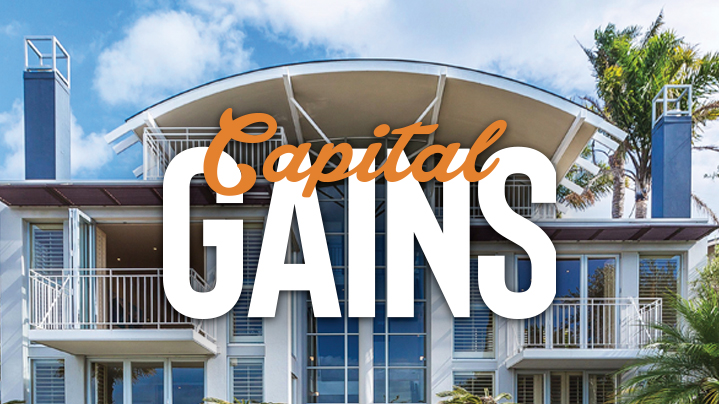Capital Gains
Smart moves that can unlock the financial potential within your home.
Bigger houses, higher prices, more capital gains… Over the past four decades, New Zealand has experienced a housing boom. While the average family home has expanded to 205m2 – nearly twice the size of houses built in the 1980s – over the same period prices have risen an eye-watering 658 percent, from around $89,000 to $674,000. As a consequence, there are now many Kiwis living in big houses and sitting on hundreds of thousands of dollars of equity.
With such a large amount of capital comes an important decision: do you use your home like an ATM, and borrow against it to fund expensive cars, lavish kitchens and overseas trips? Or do you regard the money tied up in your bricks and mortar as part of your investment portfolio, and make informed decisions about how to maximise its potential?
The choice should be a simple one. Whether you want to fund a long and active retirement, reduce your current financial liabilities, or both,
the equity in your property and how you put it to work can be the key to a secure financial future.
Downsizing
As our population continues to age (by 2051 a quarter of New Zealanders will be over 65), downsizing has become a buzzword for a generation of baby boomers looking to make the most of their retirement years.
Selling a large family home and moving to a smaller, cheaper property is a simple and easy way for any family, regardless of age, to release equity, as well as slash daily living costs and free up leisure time. A modern, smaller terraced home or apartment is not only cheaper to run, its smaller outdoor area and lock-up-and-leave design means less time spent on DIY, mowing lawns and gardening.
For retirees, selling up and moving to a smaller home is also a far better financial option than taking on a reverse mortgage. While a loved and cherished family home that is full of memories can be hard to leave, it’s important not to let your heart override your head when it comes to important financial decisions.
If you have spent a lifetime working hard to own your home outright, it makes little sense to then borrow large sums against it so you can remain living there. By selling up and downsizing, you’ll pocket all your capital gains, instead of paying tens of thousands of dollars in fees and interest.
Subdividing
For those people fortunate to live in a house with a large garden, subdividing can be a lucrative – though paperwork-intensive – way to liquidate real estate equity. In Auckland – where land is very expensive and represents the biggest part of a property’s valuation – it is an even more rewarding option.
Under the Auckland Unitary Plan, each site in a single-house zone needs to be a minimum of 600m2. As average land values around Auckland City and the North Shore are close to $1 million for a similar sized plot, the $120,000 to $150,000 cost of an average two-lot subdivision is a solid investment. In addition to the capital gains, the cost of remaining in your own home will become cheaper, due to a reduction in its rateable value.
Moving Suburbs
If downsizing or subdividing is not an option, and you still need the space or land to accommodate your family or lifestyle, moving to a cheaper suburb is another easy way to free up the cash locked into your home.
Nobody likes having to move home. In the short-term, it’s one of the most stressful events in any person’s life. However, the long-term financial gains can be substantial. In Auckland, the average house price sits at around $1,054,000. Across the city, that ranges from $662,000 in Franklin, to $1,225,000 on the North Shore – a difference of $563,000.
If you want to unlock the capital in your property by relocating to a home in a cheaper suburb, the current market is an ideal one in which to move. Activity among movers (as opposed to first-home buyers and investors) is at the lowest level in nine years, currently 23 percent of sales, meaning less competition for quality homes, and more time for you to do your homework and secure a great new home at the best price. If children and school zones are not a consideration, short-term rentals are a great way to test-drive living in a new area before you decide to put down more permanent roots.
Sea Change
While moving to a cheaper suburb can be financially rewarding, it can come with detrimental changes, for example longer commute times, more intensive housing or greater noise and surrounding industry. That’s why, for an increasing number of people, making a complete sea change and heading off to the regions has become a way to improve not only their finances, but their lifestyles.
Despite the popularity of Tauranga with Aucklanders over recent years, the difference in average house prices in the two centres is still pronounced. With an average price of $700,300, a house in Tauranga is still more than $350,000 cheaper than a comparable home in the City of Sails, plus it comes with the town’s laid-back lifestyle benefits.
The price difference is even more pronounced between Auckland and Whangarei, whose average house price of $483,000 is increasingly financially appealing to Aucklanders.
If you are willing to make a change to the part of the country in which you live, you can potentially unlock hundreds of thousands of dollars locked up in your home’s value.
Releasing equity from your home begins with a financial decision, but you must already have your ultimate goal in sight. Whether you want a comfortable and active retirement or freedom from financial pressure, be clear about your objective, so that wherever you live during the next chapter of your life, you can be confident that you’ve made the right move.
Read more...
[Download PDF]